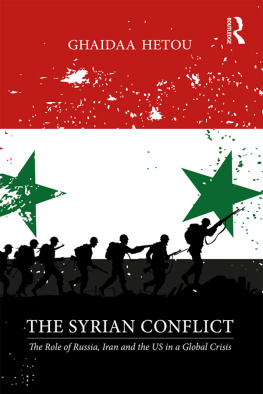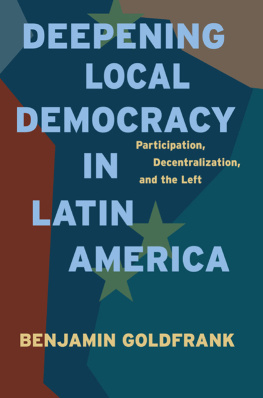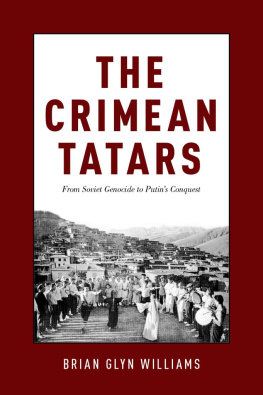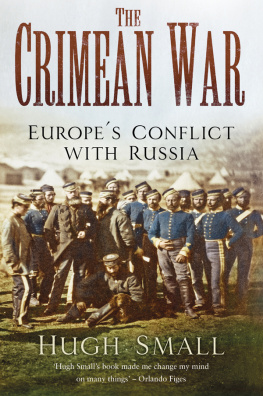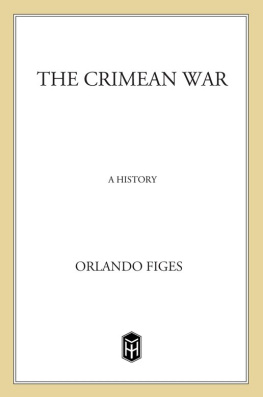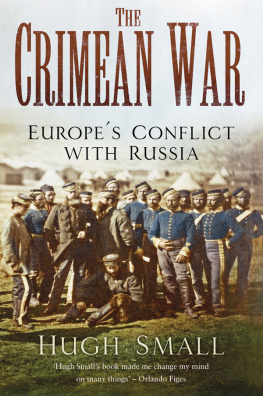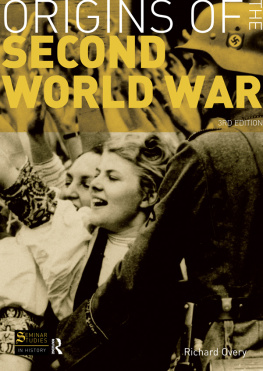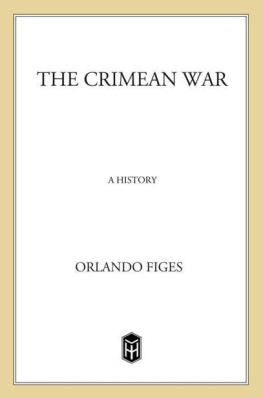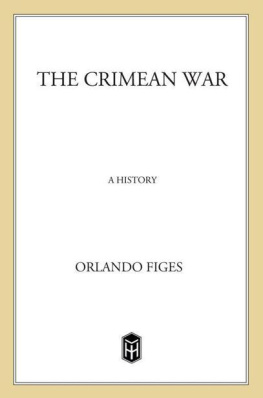THE ORIGINS OF THE CRIMEAN WAR
ORIGINS OF MODERN WARS
General editor: Harry Hearder
Titles already published:
THE ORIGINS OF THE FRENCH REVOLUTIONARY WARS
T.C.W. Blanning
THE ORIGINS OF THE CRIMEAN WAR
David M. Goldfrank
THE ORIGINS OF THE ITALIAN WARS OF INDEPENDENCE
Frank J. Coppa
THE ORIGINS OF THE WARS OF GERMAN UNIFICATION
William Carr
THE ORIGINS OF THE RUSSO-JAPANESE WAR
Ian Nish
THE ORIGINS OF THE FIRST WORLD WAR (Second Edition)
James Joll
THE ORIGINS OF THE SECOND WORLD WAR IN EUROPE
P.M.H. Bell
THE ORIGINS OF THE SECOND WORLD WAR IN ASIA AND THE PACIFIC
Akira Iriye
THE ORIGINS OF THE KOREAN WAR
Peter Lowe
THE ORIGINS OF THE VIETNAM WAR
Anthony Short
THE ORIGINS OF THE ARAB-ISRAELI WARS (Second Edition)
Ritchie Ovendale
THE ORIGINS OF THE CRIMEAN WAR
David M. Goldfrank
First published 1994 by Longman Group Limited
Published 2013 by Routledge
2 Park Square, Milton Park, Abingdon, Oxon OX14 4RN
711 Third Avenue, New York, NY 10017, USA
Routledge is an imprint of the Taylor & Francis Group, an informa business
Copyright 1994, Taylor & Francis.
All rights reserved. No part of this book may be reprinted or reproduced or utilised in any form or by any electronic, mechanical, or other means, now known or hereafter invented, including photocopying and recording, or in any information storage or retrieval system, without permission in writing from the publishers.
Notices
Knowledge and best practice in this field are constantly changing. As new research and experience broaden our understanding, changes in research methods, professional practices, or medical treatment may become necessary.
Practitioners and researchers must always rely on their own experience and knowledge in evaluating and using any information, methods, compounds, or experiments described herein. In using such information or methods they should be mindful of their own safety and the safety of others, including parties for whom they have a professional responsibility.
To the fullest extent of the law, neither the Publisher nor the authors, contributors, or editors, assume any liability for any injury and/or damage to persons or property as a matter of products liability, negligence or otherwise, or from any use or operation of any methods, products, instructions, or ideas contained in the material herein.
ISBN 13: 978-0-582-49055-0 (pbk)
British Library Cataloguing-in-Publication Data
A catalogue record for this book is available from the British Library
Library of Congress Cataloging-in-Publication Data
Goldfrank, David M.
The origins of the Crimean War / David M. Goldfrank.
p. cm. (Origins of modern wars)
Includes bibliographical references and index.
1. Crimean War, 1853-1856-Causes. 2. Crimean War, 1853-1856Diplomatic history. 3. EuropePolitics and government1848-1871. I. Title. II. Series.
DK215.G57 1993
947.073dc20
Contents
Professor Goldfranks study of the origins of the Crimean War is both immensely scholarly and intellectually exciting, in that it grapples successfully with a subject of considerable complexity. The war was the first between the Great Powers since Waterloo, and there was to be no other between more than two of the Great Powers until 1914, if Italy in 1866 can be dismissed as being not yet a Great Power. Goldfrank considers the war to have been somewhat bizarre for several reasons, one of which was the reluctance of the Tsar to come to terms, when it would surely have been to his advantage to do so. As the eleventh volume in the series, then, the origins of the Crimean War provide an intriguing study.
One striking value of Goldfranks work is his willingness to consider what, with reference to the First World War, was once called the war guilt question. The war guilt approach between the two world wars became unfashionable because of the animosity it aroused, with the unfortunate result that historians became shy of passing value judgements on the origins of the First World War. After 1945 everyone was ready to concede that Hitler had been responsible for the Second World War, with only AJ.P. Taylor raising some original, if infuriating, questions.
That individual political leaders can be charged with responsibility for the Crimean War Goldfrank does not doubt. Nor is he mealy-mouthed about it: Nicholas I was more responsible than any other person for the Crimean War (p. 284). It is a conclusion reached after an exhaustive study of Russian, French, British, Austrian, German and even Swedish and Belgian archives, and a consideration of the roles of the other principal actors, and of their servants among the diplomats. Earlier, Goldfrank points out that Nicholas was more interested in the military side of things (p. 229). But the Tsar was more than simply an unimaginative military leader. Goldfrank refers to Nesselrodes mystification and cult of the Emperor in a despatch that the latter approved: The true thinking of the Emperor is of a higher order than one can comprehend in Constantinople, and perhaps, elsewhere His Majesty obeys his conscience (p. 150). An autocrat in command of vast armies, who obeys his conscience only, is a terrifying phenomenon in history.
But Goldfrank shows clearly the failings of the British and French also. The British public, in particular, was in one of its phases of jingoism, though the term had not yet been invented. Goldfrank makes the interesting point that Napoleon Ills government tried to pretend to its public that its policy was more pacific than it really was, while the British government endeared itself to its public by pretending that it was more aggressive than it really was. Clarendon, the Foreign Secretary, Goldfrank points out, lied through his teeth, in saying: We want nothing for our trade, and we fear nothing for our Indian possessions. (p. 264). But Goldfrank is less severe on Clarendon, Stratford Canning and British policy generally than was Paul Schroeders Austria, Great Britain and the Crimean War, which was published in 1972.
I must not give the impression, however, that Professor Goldfrank is concerned exclusively with apportioning blame. On the contrary, he shows convincingly how economic factors and the breakdown of the Concert of Europe after 1848 provided a setting for the war, and concludes: both nationalism and the counter-revolution were pervasive forces during 184853, but they did not have to result in a Russo-Turkish or Crimean War (p. 282). Earlier he had commented that the weakening of the Concert of Europe had made unilateral strident moves by the Great Powers possible, but none of them had rational grounds for provoking a war. Only an irrational impulse, one sufficiently powerful to override simple considerations of other states interests and the balance of power would set off war under these circumstances (p. 77).
Harry Hearder
The author would like to express his gratitude to (1) the International Research and Exchanges Board (IREX), the Association of Professional Schools of International Affairs (APSIA), and the Provosts Office, Graduate School, School of Foreign Service, History Department, and Russian Area Studies Program of Georgetown University for travel and research support; (2) two graduate research assistants for the background chapters, Karen Taylor-Brovkin and Theresa Safon; (3) the staffs at the European archives and libraries he utilized, and especially those in Russia, who have been labouring in recent years under very difficult conditions among them, L.A. Murashova, formerly of the Russian Foreign Ministry Archive (AVPR), and I.M. Florianova of the Naval Archive (TsGAVMF); (4) his encouraging and helpful Georgetown colleagues including two historians who read earlier versions of this manuscript, Professors Aviel Roshwald and Richard Stites; (5) his engaging graduate students in particular, Douglas Brown, Paul Heinemann, David Rich and (now) Professors Hubertus Jahn and Michael Smith; (6) specialists in Russian and European diplomatic history, many of whose invaluable works appear here in the notes and bibliography and two of whose do not A.V. Ignatiev and V.N. Ponomarev; (7) his patient wife Jane; and (8) his first erudite teachers his parents, Sylvia and the late Max Goldfrank.



